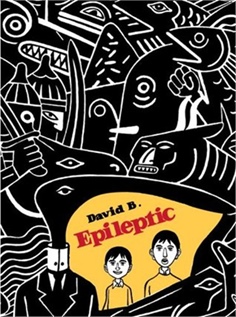Description
Hailed by The Comics Journal as one of Europe’s most important and innovative comics artists, David B. has created a masterpiece in Epileptic, his stunning and emotionally resonant autobiography about growing up with an epileptic brother. Epileptic gathers together and makes available in English for the first time all six volumes of the internationally acclaimed graphic work. David B. was born Pierre-François Beauchard in a small town near Orléans, France. He spent an idyllic early childhood playing with the neighborhood kids and, along with his older brother, Jean-Christophe, ganging up on his little sister, Florence. But their lives changed abruptly when Jean-Christophe was struck with epilepsy at age eleven. In search of a cure, their parents dragged the family to acupuncturists and magnetic therapists, to mediums and macrobiotic communes. But every new cure ended in disappointment as Jean-Christophe, after brief periods of remission, would only get worse. Angry at his brother for abandoning him and at all the quacks who offered them false hope, Pierre-François learned to cope by drawing fantastically elaborate battle scenes, creating images that provide a fascinating window into his interior life. An honest and horrifying portrait of the disease and of the pain and fear it sowed in the family, Epileptic is also a moving depiction of one family’s intricate history. Through flashbacks, we are introduced to the stories of Pierre-François’s grandparents and we relive his grandfathers’ experiences in both World Wars. We follow Pierre-François through his childhood, adolescence, and adulthood, all the while charting his complicated relationship with his brother and Jean-Christophe”s losing battle with epilepsy. Illustrated with beautiful and striking black-and-white images, Epileptic is as astonishing, intimate, and heartbreaking as the best literary memoir.
About the Author
Pierre-François Beauchard, who uses the pen name David B., was one of the initiators of the French alternative editorial house L'Association, and is now well-known among the French comics audience. After his Applied Arts studies, David B. had his first publications in magazines such as Chic, Circus, Okapi and A Suivre. Among his early creations are 'Le Timbre Maudit', a story published in Okapi, and 'the mini-series 'Zèbre' in Chic. As a scenarist, he cooperated with Olivier Legan on 'Pas de Samba pour Capitaine Tonnerre', an album published by Glénat in 1985.After he co-founded L'Association in 1990, he began using the pseudonym David B. and specialized in short black-and-white stories, detailing nightmarish dreams, collected in the album 'Le Cheval Blême' in 1992. As powerful as his dream imagery is in itself, it is amplified by his masterful use of black and white drawings. In the Association's magazine Lapin, he published series like 'Le Prophète Voilé', 'Le Jardin Armé' and 'Le Voyage de l'Est'. From 1996, Beauchard has concentrated on the autobiographical series 'L'Ascension du Haut-Mal', which earned him the highest praise from comics critics.In addition to his work for L'Association, David B. cooperated with the publishing house Cornélius, where he published the quarterly comic book Le Nain Jaune from 1993 to 1994, as well as 'Les Quatre Savants' from 1996 to 1998. He was also present in the reviews Fusée and Le Cheval sans Tête (with 'Les Incidents de la Nuit'). Also present at Dargaud, he made 'Le Tengû Carré', an allegory of Japanese legends, and the scenarios of 'La Révolte d'Hop Frog' and 'Les Ogres', which were illustrated by Christophe Blain. For the publisher's collection Poisson Pilote, he made 'Urani - la Ville des Mauvais Rêves' (script by Joann Sfar) and 'Les Chercheurs de Trésor'.After May 2000 David B's work would reach a wider public when his artwork was featured in the collection Aire Libre by the popular publisher Dupuis. After 'Le Capitaine Écarlate' (with artwork by Emmanuel Guibert) in 2000, David wrote and drew the album 'La Lecture des Ruines' in 2001. David B has also been active as an illustrator for Le Seuil, Automne 67, Albin Michel and Coconino Press.
